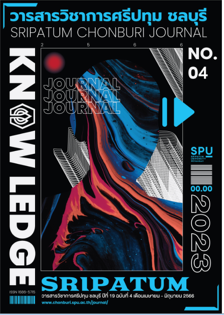INFLUENCE OF LEADERS’ CHARACTERISTICS ON EMPLOYEES’ READINESS FOR CHANGE IN MOLD FACTORIES IN CHONBURI PROVINCE
Keywords:
Leader's Characteristics, Readiness for Change, Mold IndustryAbstract
The purposes of this research were 1) to compare the readiness for change of employees in a mold factory in Chonburi Province who were classified by demographic characteristics and 2) to study the influence of on employee readiness for change of mold factories in Chonburi province. Factory workers chosen by a convenient sampling method were sent a questionnaire to fill out during their lunch break and after work. The samples of this research were 372 employees in mold factories in Chonburi province Statistics used in data analysis were frequency, mean, test of variance, and multiple regression equation analysis. The results showed that 1) the respondents rated different level of readiness for change due to gender, job title, income, and work experience and 2) the factor of leaders’ characteristics that affected employee’s readiness for change consisted of expertise, knowledge transfer, and participation.
References
กรมส่งเสริมอุตสาหกรรม. (2547). อุตสาหกรรมแม่พิมพ์ของไทย (ออนไลน์). เข้าถึงได้จาก: https://www.ryt9.com/s/ryt9/154622
, 3 ธันวาคม].
กัญจน์ณัฏฐ์ คงวิโรจน์. (2564). พฤติกรรมของผู้นํา แรงจูงใจของพนักงานปฏิบัติการที่มีประสิทธิผลในการทํางานของธนาคารแห่งหนึ่งใน
กรุงเทพมหานคร. การค้นคว้าอิสระบริหารธุรกิจมหาบัณฑิต บัณฑิตวิทยาลัย มหาวิทยาลัยกรุงเทพ.
เกตุศิรินทร์ เพ็ชรบูรณ์. (2556). ภาวะผู้นำการเปลี่ยนแปลงและวัฒนธรรมองค์การที่ส่งผลต่อประสิทธิผลในการปฎิบัติงานของพนักงาน
ระดับปฏิบัติการ. Journal of Management Science Chiangrai Rajabhat University, 10(1), หน้า 1-21.
ณัฐภัสสร ธนาบวรพาณิชย์. (2563). ภาวะผู้นำและบทบาทของผู้บริหารในองค์กรรัฐในยุคการเปลี่ยนแปลง. วารสารวิชาการมหาวิทยาลัย
นอร์ทกรุงเทพ, 9(1), หน้า 28-39.
ณิชามล ฟองน้ำ. (2558). คุณลักษณะส่วนบุคคลพฤติกรรมผู้นำและการทำงานเป็นทีมที่มีประสิทธิผลในการทำงาน. การค้นคว้าอิสระ
บริหารธุรกิจมหาบัณฑิต บัณฑิตวิทยาลัย มหาวิทยาลัยกรุงเทพ.
ยุทธนาท บุณยะชัย. (2563). ลักษณะภาวะผู้นำของผู้บริหารกับแรงจูงใจในการทำงานของบุคลากร กรณีศึกษา มหาวิทยาลัยเอกชน
เครือข่ายความร่วมมือเบญจมิตรวิชาการ. วารสารมนุษยศาสตร์สังคมศาสตร์, 6(2) หน้า 182-195.
สมาคมอุตสาหกรรมแม่พิมพ์ไทย. (2558). รายชื่อสมาชิกสมาคมอุตสาหกรรมแม่พิมพ์ไทย (ออนไลน์). เข้าถึงได้จาก:
https://www.tdia.or.th/members/ [2565, 3 ธันวาคม].
Bouckenooghe, D., Devos, G., & Van Den Broeck, H. (2009). Organizational change questionnaire–climate of change,
processes, and readiness: Development of a new instrument. The Journal of psychology, 143(6), pp. 559-599.
Maurer, T.J., & Lippstreu, M. (2008). Who will be committed to an organization that provides support for employee
development? Journal of Management Development, 27(3), pp. 328-347.
Mayer, R.C., & Davis, J.H. (1999). The effect of the performance appraisal system on trust for management. Journal
of Applied Psychology, 84(1), pp. 123-136.
Yamane, T. (1973). Statistics: an introductory analysis. New York: Harper & Row.
Downloads
Published
Issue
Section
License
Copyright (c) 2023 วารสารวิชาการศรีปทุม ชลบุรี Sripatum Chonburi Journal

This work is licensed under a Creative Commons Attribution-NonCommercial-NoDerivatives 4.0 International License.
บทความทุกบทความเป็นลิขสิทธิ์ของวารสารวิชาการศรีปทุม ชลบุรี



